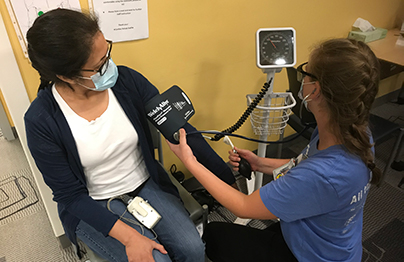
For many people who suffer from COVID-19, the effects of the illness can be long term with serious issues lasting for months. Research indicates that up to 35 percent of patients experience symptoms ranging from fatigue to joint pain, headaches and heart abnormalities that can last for months.
A limited group of Swedish Hospital patients who have suffered with significant long term side effects are working to overcome them in a specialized cardiovascular rehabilitation program at Swedish Hospital. The COVID Rehabilitation pilot program was initially developed to help several Swedish employees who were diagnosed with COVID-19 and “recovered” but were still experiencing chronic symptoms like shortness of breath, and were struggling to return to baseline functionality.
“These patients are motivated to get back to the activities they used to participate in, whether that was regular exercise, getting back to work or just being able to walk around the house with less shortness of breath,” said Linda Granato, Clinical Exercise Physiologist. “We have seen significant changes in these patients in how they approach exercise, how they are progressing and how that can help them feel better when they try to do things at home.”
The initial patients are already observing benefits in their daily lives. “As a nurse I saw firsthand the long term effects of COVID-19 on patients and then I experienced these continuing symptoms myself,” said Mary, a nurse at Swedish Hospital. “The program is providing me with excellent support and therapy that has helped me progress in my recovery and now I’m able to walk up-stairs and walk for longer distances.”
.jpg?sfvrsn=bbadabc8_0)
Social and Emotional Support
There is also a social and emotional aspect of the program provided by nurses and exercise physiologists who work together to develop a personalized plan for each patient. The program lasts 12 weeks and includes supervised exercise, education, lifestyle counseling and group support.
“The patients benefit from being able to talk to people who have gone through similar experiences as a result of their diagnosis,” added Linda. “After a few months, patients are experiencing less shortness of breath and noticing how much easier it is to do normal activities and be able to return to a full shift at work.”
“Since no one can actually determine a true prognosis of a new illness it tends to create fear and anxiety; and thoughts of will I ever be my normal again,” said Huda, an ICU nurse who is a participant in the rehab program classes that meet twice a week for 30 to 60 minutes. “Holding onto hope and being positive can be difficult, but a program like this which allows you to track your progress, offers hope and the motivation to keep pushing through towards the light at the end of the tunnel and a return to normal functioning can be invaluable.”
For patients who have had very little or no experience with exercise, this program can be a wake-up call as their bodies take time to adjust to the physical work involved in the program. “We definitely start slow and adjust to everyone’s individual needs and progress as they are comfortable,” said Courtney Carlson, Clinical Exercise Physiologist.
The program is currently being supported by a donation from the Swedish Hospital Foundation. For more information, call the Cardiopulmonary Rehabilitation Department at
773-878-8200, ext. 7354.

